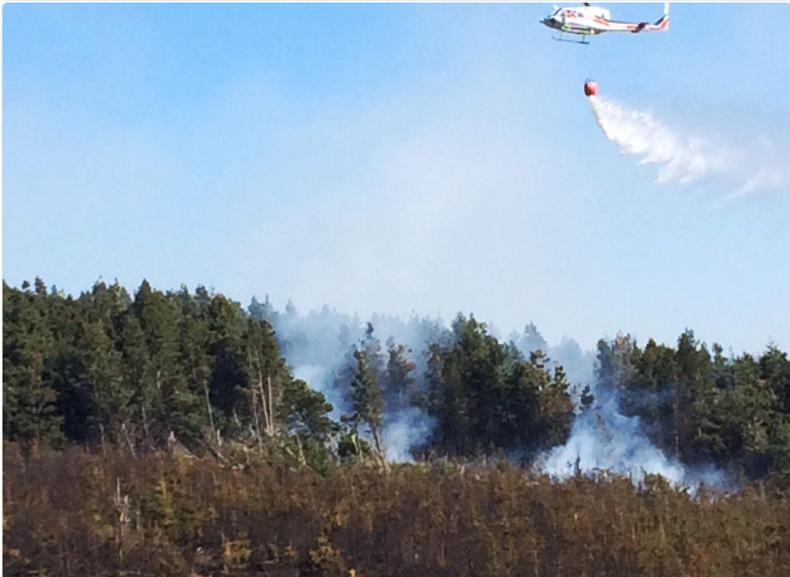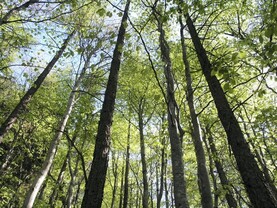The Irish Air Corps has been drafted in to help fight an out of control fire that has already destroyed almost 2,500ac of Coillte forestry in Co Galway.
Cloosh Valley forest in Connemara includes almost 10,000ac of mixed aged forestry and the Galway Wind Farm and is in danger of being consumed by wildfire.
Coillte has said that despite the best efforts of its staff and local ground crews, as well as a helicopter, the fire at Cloosh Valley escalated out of control on Monday afternoon.
Speaking to the Irish Farmers Journal on Monday night, Gerard Murphy, managing director of Coillte Forest, said that around 2,500ac of forestry in Cloosh has already been damaged by the fire.
Around 2,500ac of forestry has already been damaged by the fire
“We estimate that about 1,000ha have been damaged to date,” said Murphy. “We have ground crews on standby tonight to observe.”
He added that working at night was too dangerous and that everyone was hoping for the wind which is fanning the flames to die down.
Two helicopters will be used to tackle the flames on Tuesday morning, including one from the Air Corps which has already helped to fight fires in the Ox Mountains, Co Sligo.
The Air Corps helicopter took almost 50,000 litres from Easky Lough to use in the surrounding areas, completing 37 fire-fighting runs.
Take a look at the #OxMountains at the moment. We're battling with local crews. #makingitrain @defenceforces pic.twitter.com/ttCm1wGJf6
— Irish Air Corps (@IrishAirCorps) May 6, 2017
Murphy said that the recent outbreak of fires, particularly across the west and north of the country, have been responsible for the worst damage to Coillte’s estate since 2011.
“The combined loss of productive timber, together with the cost of replanting the affected areas will result in a multi-million euro bill,” he said.
Commercial spruce crops are worth around €1,000/ac for young plantations, up to €4,000/ac for thinning stage crops and around €16,000 close to clearfell or harvesting stage.
Murphy said that Coillte has already lost between 250ac and 500ac of forestry to wildfires before the Cloosh fire began.
“The next few days are really high risk for us,” he added.
Deliberate fire setting has been a significant factor in the cause of many of the fires on Coillte property
Coillte has highlighted that while recent dry and windy weather has greatly increased the risk of gorse and forest fire, deliberate fire setting has also been a significant factor in the cause of many of the fires on Coillte property around the country.
“In addition to the damage caused to commercial forestry, these forest fires pose a significant risk to farmland, native woodland and areas designated for nature conservation,” said Murphy.
Coillte appealed to the public to be extra vigilant towards the dangers of wildfire and be mindful that responsible behaviour, including acting safely and responsibly in rural environments, can significantly reduce the chance of wildfire starting.
It also called on the public to report any suspicious activity regarding the setting of fires to the local Garda Síochána.






 This is a subscriber-only article
This is a subscriber-only article













SHARING OPTIONS: